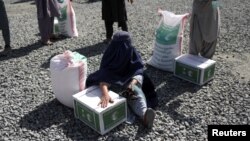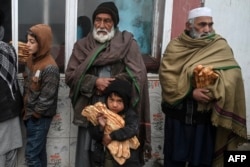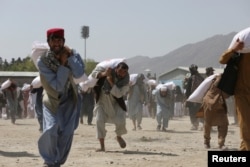Afghanistan is again facing risks of mass starvation in coming months as critical relief operations suffer substantial funding shortfalls.
The World Food Program (WFP) says it faces a net funding shortage of $960 million to sustain humanitarian operations over the next six months.
"Funding shortfalls and skyrocketing prices mean WFP has been forced to take hard decisions earlier this year to cut down activities to the bare minimum from June to August, temporarily focusing assistance on 10 million people who face the most urgent and life-threatening needs," Philippe Kropf, the WFP's head of communication in Afghanistan, told VOA.
Almost 19 million Afghans – more than half of Afghanistan's estimated population – are facing critical levels of hunger, aid agencies say.
Funding is urgently required to procure and stock relief supplies in parts of the landlocked country that become inaccessible during the winter.
"If we fail to secure funding and preposition food before winter starts in October, people will starve," Kropf warned.
To avert starvation and death in the country, the U.N. asked donors for $4.4 billion earlier this year. As of July 28, less than 45% of the appeal has been funded.
The U.S., the largest humanitarian donor to Afghanistan, has pledged almost $460 million for the appeal, followed by the United Kingdom ($408 million) and Asia Development Bank ($380 million).
"I think for the United States, the ongoing humanitarian crisis in Afghanistan is among the highest priorities that drive American decision making," Thomas West, U.S. special envoy for Afghanistan, told Uzreport TV this week.
Millions malnourished
Almost five million children and pregnant and lactating women in Afghanistan face malnutrition this year, while 3.9 million children are already malnourished, aid agencies say.
"Malnutrition is a life-threatening illness, and if they don't get treatment in time, severely malnourished children face a very real risk of death," Sacha Myers, a spokesperson for Save the Children Afghanistan, told VOA.
While praising donors for giving almost $2 billion in humanitarian assistance to Afghanistan this year, aid workers say the country needs economic recovery and development aid to rid itself of recurring cycles of humanitarian emergencies.
Donors have cut off development aid to Afghanistan since the Taliban seized power last year. The new Taliban leadership also faces strict financial sanctions, which have crippled Afghanistan's banking sector.
"Almost a year has passed, and still the international community hasn't got any closer to finding a solution to this financial standoff. Until they take steps to resume development aid and revive the economy, they are complicit in the loss of every child who dies from hunger and disease," said Myers.
Foreign aid made up over half of Afghanistan's budget, even before the Taliban took power.
International donors have repeatedly urged the Taliban to open secondary schools for girls, allow women to work, and form an inclusive government, but Taliban leaders have remained defiant insisting they have formed a purely Islamic system.






